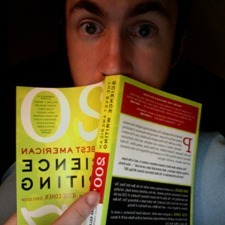Ten Questions with… Sean DeLauder
Today with us is Sean DeLauder, author of the hysterical sci-fi novella The Speaker for the Trees. Thank you for being here!
* * *
 Author Bio: This author has held several positions in recent years, including Content Writer, Grant Writer, Obituary Clerk, and Staff Writer, and is under the false impression that these experiences have added to his character since they have not contributed much to his finances. He was awarded a BFA in Creative Writing and Journalism and a BA in Technical Communication by Bowling Green State University because they are giving and eager to make friends. He has a few scattered publications with The Circle magazine, Wild Violet, Toasted Cheese, and Lovable Losers Literary Revue, and resides in the drab, northeastern region of Ohio because it makes everything else seem fascinating, exotic, and beautiful.
Author Bio: This author has held several positions in recent years, including Content Writer, Grant Writer, Obituary Clerk, and Staff Writer, and is under the false impression that these experiences have added to his character since they have not contributed much to his finances. He was awarded a BFA in Creative Writing and Journalism and a BA in Technical Communication by Bowling Green State University because they are giving and eager to make friends. He has a few scattered publications with The Circle magazine, Wild Violet, Toasted Cheese, and Lovable Losers Literary Revue, and resides in the drab, northeastern region of Ohio because it makes everything else seem fascinating, exotic, and beautiful.
He is currently at work on a trilogy involving heroes, dirt, and monsters that cannot be defeated, only escaped.
Author Website: http://www.goodreads.com/author/show/...
I do have a Goodreads blog, but I’m not a very enthusiastic blogger and I have a boy who was born in January, so I don’t spend as much time on it as I should if I wanted it to be successful.
You can find his work at Amazon, in both digital and print!
About the Writer
1. What five words describe you?
Oxymoronic
Persistent
Distracted
Skeptical/Misanthropic
Hopeful
Oxymoronic could probably be implied just by glancing at the list, but most people are an amalgamation of constantly evolving contradictions in personality, opinion, etc., they’re just reluctant to admit it. At least, that’s how I rationalize my inconsistency. And, so far as I know, I’m not bipolar or dangerous in any fashion.
With regard to persistence, I’m the sort of person who doesn’t get things done in a single herculean effort. However, I am the sort of person who will continue at something, even if intermittently, until it is done, for eternity if necessary. I think if you told me to cut down a tree with a hatchet, I probably wouldn’t spend hours at a time whacking away. But I would certainly give it a smack once a day, consistently, until it fell over. In that respect, I am the Andy Dufresne of lumberjacks.
I do have periods of intense, seemingly unbreakable concentration. And yet, despite these episodes of tenacity, I feel like I’m very easily distracted. It’s rare that I engage in one task completely without devoting 30% of my brain to getting excited about what I’m going to do next, even when the Thing I’m Doing Right Now is the Thing I’ve Been Waiting All Day To Do.
My skepticism is pervasive enough that I rarely take anyone’s word at something unless they have proven themselves a reliable source. This could be due to a misanthropic distrust, but one that seems pretty well founded considering the world is built upon a foundation of ulterior motives that seemingly only on occasion consists of unadulterated truths. It also helps me make an effort to ground even my most surreal stories in some kind of truth or explain the behavior of all my characters, beyond the stereotypical.
To continue in the vein of somewhat incompatible characteristics, I find myself ever cheering for human accomplishment. Maybe this is a form of species narcissism or home-team fanhood, but I want humanity to do well, I think they can do well, and if they don’t… my pessimistic side told me long before that it couldn’t have happened any other way.
2. What was the first story you ever wrote? I mean the really bad one we all have that you’re trying to hide in the back of closet now that you’re published?
When I was seven years old, I wrote a story about a raccoon that changed species each time it sneezed. I don’t remember how the story ended, nor do I remember how anyone found out about it, but I remember this painfully illustrated story (my drawing skills were, and remain, impressionistic at best) in a small ringed notepad landing me in a writing contest in Toledo, Ohio. I recall being subject to several hours of workshopping before being asked to write an original story for judging. Not surprisingly, I decided that writing, which I’d undertaken because it was fun and limitless, was boring, and didn’t try it again for some time.
To the relief of some, and probably the despair of many, that hiatus was not permanent.
3. What inspires you?
In a truly astounding piece of irony, I would say humanity inspires me. I am inspired by human potential. I find it amazing how far we’ve come in so little time—the plot of human technological advancement over time looks more and more like a hockey stick—and I’m excited by where we might be headed. I am fascinated by how much technology mirrors fiction—how often do you learn about some new piece of technology that had been described 30 years ago in some novel by Heinlein, or some such? It’s fascinating to think that in some future time, some piece of technology I dreamt up might one day become a reality.
Why is this inspiration ironic? I am an unabashed misanthrope, made so by my experience with people who make me wonder how so many achievements were possible by a species so bigoted, insensitive, and in many, many, many cases, profoundly stupid. If anything, I think this serves to emphasize just how brilliant the few geniuses of the world are—they move us forward intellectually and technologically despite the crushing burden of carrying 4 billion imbeciles on their shoulders. I wish I could say the same for myself, but my genius is dubious, my knees bother me, and I get sore if I put too much strain on my back.
4. What distracts you?
That really depends on how invested I am in something. If I am fully invested in something, be it writing, reading, or a particularly satisfying sandwich, I become impenetrable. A bomb might go off in my home and the first hint I would have of a world outside my sandwich might be elicited in an expression of disappointment as the sandwich disintegrates in my hand. Any attempts to interrupt these instances of intense concentration are about as hopeless as a woodpecker with a rubber beak.
In terms of writing, my habits are pretty poor. Not that I don’t have a grasp on the English language or that my penmanship is indecipherable (though, admittedly, when I scribble down ideas on napkins or scraps of envelope, as far as anyone else is concerned, they may as well be encrypted), but I have a bad habit of making sure I complete every conceivable chore I can think of before I sit down and write. I don’t know if this is because I don’t want to have any distractions encamping themselves in the back of my mind or if I’m putting off writing for fear of not being able to write well—and that seems like a perfectly normal fear for a writer who wants to do well to have.
Ultimately, my most productive times are when I have an idea that is so pervasive that it gets in the way of everything else—just the reverse of whenever I try to sit down and write of my own volition.
5. What’s your favorite story? This can be specific, as in a particular book or even story-driven movie, or general, like “I’m a sucker for a hero looking for redemption story.”
This is easy: any story that champions perseverance in the face of adversity. If I could give that story a name, it would be The Once and Future King. If I could give that story an author, it would be T.H. White. In effect, my own writing is an homage to that ideal—I’m chasing something I don’t know that I’ll ever be able to achieve, any more than a mountain climber’s ultimate goal is to climb all the way to the moon. Dan Fogelberg said it best in Leader of the Band: “My life has been a poor attempt to imitate the man, I’m just a living legacy to the leader of the band.”
Okay, so maybe that comparison is a bit more dire and hopeless than I’d like, and I don’t really feel my style is comparable to White’s, but my esteem for White’s collection of Arthurian tales really makes it seem… unachievable to write a story that cohesive and meaningful. The futility inherent in that story being a king trying to create a great civilization, but fighting against the one thing he cannot overcome and will ever be the ruin of perfect harmony: human nature. Grim as that may sound, it is the warmest, most well-written, most brilliant, troubling, amusing, and funny story I’ve ever read. It may not be the strongest in each of those categories, but it’s certainly close and it combines them in a way that I have never encountered in a book before.
* * *
About the Writing

1. Tell us about your currently available titles.
At present there is just one: The Speaker for the Trees. Christopher Lambert might tell you that there can be only one, but that is patently untrue. The rest just aren’t finished yet.
2. What’s your favorite part about writing these stories?
In every story I learn a little more about people and about myself. Each of my characters is, in some way, an extension of myself. Each character represents a fragment of my own character, or what I would like it to be, and it’s interesting to see how components of my personality interact with one another, especially when they do not agree. We’re all a bunch of tightly nested hypocrisies, and it’s fascinating to see which aspects of personality win out based on the situation.
I also enjoy the sheer experimentation that comes from writing. I am the master of my domain—all that I can imagine, can be, if I will it. Writing is often a two-step process for me that begins with me trying to invent something completely off the wall and then trying to make sense of it.
3. What would your characters say about you? Be honest!
My characters would say what they lack in intellect they make up for in persistence. This is a trait they inherited directly from their creator. They would probably rue their heavy reliance upon persistence due to the lack of intellect their creator is capable of bestowing upon them, given his own shallow resources.
4. Who would play your favorite character if they made a movie of their story?
Being what it is, I’m not sure any Hollywood actors would fit the physical requirements to play Hedge. I can see uber character actors Christian Bale or Daniel Day Lewis making valiant attempts, but ultimately coming up short on account of a lack of awkwardness. I think Hedge is an intelligent, but mildly awkward and uncertain character. Zero Mostel probably had the right body type, but wouldn’t be the right person to play the character—not sure he could dial down the “zany” sufficiently. Plus, he’s suffering from a heretofore incurable case of Dead, which has dampened his performances for some time.
The closest person I can think of would be Kyle Gass of Tenacious D. I think he affects just enough awe with the world when he’s out of his element, and just enough confidence when he’s in it.
5. Do you have any projects currently in the works you want to talk about?
At present I have four main projects that I’m working on. I have a trilogy that focuses on the nature of heroes, good and evil, human nature, and all those fun things that I enjoy thinking and writing about. All of which are in varying stages of completion. At present, I don’t have a name to encompass the entire trilogy, but the individual titles are pretty well set and straightforward: A Hero, The Least Envied, and A Villain.
I’m also working on the content for a graphic novel, which my wife is extremely enthusiastic about. It’s entitled Millennium Man and concerns a man who, at the peak of human civilization, was the first in a program to extend human life so people existed to prevent the mistakes of the past by avoiding the need to relearn lessons over and over again. Unfortunately, there is a cataclysmic disaster that ruins the world, essentially sending the planet back to a level of technology similar to the dark ages, in which technology is treated as a villain because it was unable to save the planet, while theocracy rises to new heights. The main character spends his dwindling millennium of existence as a hated and hunted relic trying to return humanity to a path of scientific exploration and trying to point out the human hypocrisy and fear created by the existing social fabric. That’s not to say I have a deep and abiding hatred of religious organizations, but I think it’s clear that when they go wrong they can go really, really wrong.
* * *
Sean, thank you for visiting us today, and best of luck with your writing!



